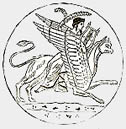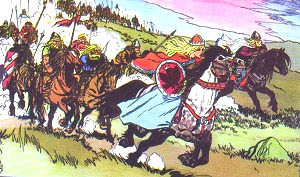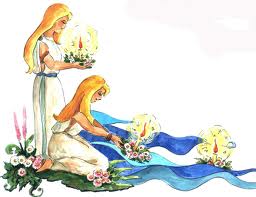 |

|
This page from now defunct okana.net. The information is too important to simply allow it to disappear. How I was able to capture Okana's long expired webpages is a mystery and a bit of Polish magic.
 Revista Hiperboreea
Revista Hiperboreea Romanian Cultural Online Magazine |
Myths Fables and Stories  Myths Fables and StoriesJanosik
Janosik was a robber, who with a group of friends, plundered, robbed, and burned the manor houses of the rich, those on the Slovakian side as well as the Polish side of the Tatra Mountains. However, he never harmed the poor in any way; on the contrary, he gave them money and gifts. Folk tales present Janosik as a hero who had supernatural powers; a magical resistance to bullets and wounds, and an ability to move from one place to another quicker than any other human being. According to the mountaineers' legend, these attributes were given to him by three witches whom he had met when he was young. Once, seeing his extraordinary courage, they decided to make him the most famous robber in all of history, and they gave him three magickal objects: an alpenstock, a shirt, and a belt. Janosik always had the three gifts of the witches with him, and, for this reason, he escaped all traps. However, he was betrayed by a girl whom he often visited, and was captured. She was tempted by a promised reward. She craftily destroyed the gifts of the three witches and then denounced the helpless Janosik to the soldiers. How the Pussy Willow Got Its FurThe Queen of the Baltic
Ages and ages ago on the bottom of the Baltic rose a spelndid palace belogning to Jurata, the Queen of those waters. Not only was the queen beautiful, but thrifty as well, ruling her domain justly and caring for the welfare of her subjects. Even when her favorite dish, flounders, was served, by order of the kind-hearted queen only half of each fish was eaten, and the other half thrown back into the sea. This is probably how the strange shape of the flounders came to be. Imagine if you can the queen's indignation when she learned that a fisherman was seen at the mouth of a river, casting his net. At last the queen decided to meet the fisherman, entice him into her amber boat, and then punish him with death for violating her laws. But when the Queen Jurata saw the young fisherman, his handsomeness so appealed to her that she declared her love to him. From then on, every evening, she swam to the shore to meet her sweetheart. However, jealous Piórun, the god of thunder, became angry and, throwing down thunderbolts, destroyed the queen's sea palace, killing the queen and her courtiers. The fisherman was chained to the seabottom. To this day, when there is a storm, one can hear his laments; the amber which is cast ashore by the waves of the Baltic are fragments of Jurata's amber palace. webmistress' note - this is the one and only reference to a name for the goddess of the seas in all the Polish mythology I have researched. St. John's Night
In very ancient Slavonic times the shortest night of the year was a fire-and-water ritual, a kind of festivity when young men leaped over bonfires to show their courage and skill, and maidens made wreaths from nine separate herbs and cast the afloat on the river. If a lad was lucky enough to fish out of the water the wreath made by his sweetheart, he was then allowed to consider himself her fiance. Only poor and clumsy Jacek could cope neither with the bonfires nor the water. He sat beneath a tree, sad and forelorn, when a faery appeared to him, and told him to go into the forest to seek the flower of the fern which blossoms only on that one night. She also told him that its magickal power makes any wish come true, but she also warned him that sharing the good fortune it would bring him was forbidden at any time ever. Jacek wandered until at last he found the wonderful flower of the fern. He made a wish: to be rich! He enjoyed his prosperity, but he soon began to long to return to his village again. He decided to visit there. When he came to his father's hut, no one recognized him in all his rich attire. Remembering what the faery had told him, he returned to his palace without giving a single coin to any of his very poor family and relatives. Years had passed, his homesickness had grown, so once again he visited his village only to find his relatives no longer among the living. HIs parents had died of hunger. From remorse, Jacek became as thin as a twig, and in his prosperity he suffered all alone, realizing that no one can be happy without sharing what he has with others. Back to the top of the page The Dragon of WawelSome centuries ago there lived in a cave at the foot of Wawel Hill a most horrible fire-belching dragon, a monster that ravaged the nearby meadows by devouring grazing cattle. In vain the bravest knights tried to overcome the dragon. Then a shoemaker named Dratewka decided to conquer the beast by a unique strategy. After stuffing a fat ram with sulphur, he placed the tasty tidbit at the cave's entrance. The dragon, being greedy as well as stupid, swallowed the treacherous gift in one mouthful. Its throat burned so that it ran to the nearby Wisła river, gulping down so much water that it burst with a great bang, thus setting the town and the surrounding countryside free from its grip of terror. The shoemaker married the king's daughter, and after the monarch's death, ascended to the throne. The dragon required weekly offerings of cattle, if not, the humans would have been devoured instead. In the hope of killing the dragon, Krakus called on his two sons, Lech and Krakus II. They could not, however, defeat the creature by hand, so they came up with a trick. They fed him a calf skin stuffed with smoldering sulfur causing his fiery death. Then the brothers argued about who deserves the honor for slaying the dragon. The older brother killed the younger brother Krakus II, and reported that the dragon killed him. When he became king, his secret was revealed, and he was expelled from the country. The city was named in recognition of the brave and innocent Krakus. A third version, by Marcin Bielski from the 15th century, tells the story about shoemaker Skuba defeating the dragon. This, most popular, fairytale version of the Wawel Dragon tale, takes place in Kraków during the reign of King Krakus, the city's legendary founder. Each day the evil dragon would beat a path of destruction across the countryside, killing the civilians, pillaging their homes and devouring their livestock. In many versions of the story, the dragon especially enjoyed eating young maidens, and could only be appeased if the townsfolk left a young girl in front of its cave once a month. The King certainly wanted to put a stop to the dragon, but his bravest knights fell to its fiery breath. In the versions involving the sacrifice of young girls, every girl in the city was eventually sacrificed except one, the King's daughter Wanda. In desperation, the King promised his beautiful daughter's hand in marriage to anyone who could defeat the dragon. Great warriors from near and far fought for the prize and failed. One day a poor cobbler's apprentice named Skuba accepted the challenge. He stuffed a lamb with sulphur and set it outside the dragon's cave. The dragon ate it and soon became incredibly thirsty. He turned to the Vistula River for relief and drank and drank. But no amount of water could quench his aching stomach, and after swelling up from drinking half the Vistula river, he exploded. Skuba married the King's daughter as promised, and they lived happily ever after. The inspiration for the name of Skuba was probably a church of St. Jacob (pol. Kuba), which was situated near the Wawel Castle. In one of the hagiographic stories about St. Jacob he defeats fire-breathing dragon. Queen WandaWebMistress' note: remember, not all faery tales end with "and they lived happily ever after" King Krak reigned happily for twenty years, and when he died, the people regretted the loss of their ruler, for he was brave, just and wise. To the place where he was buried, people brought dirt and built a mound. They kept on bringing more and more soil. The mound they built in honor of Krak still stands today outside of Krakow. 
After the death of his father, Krak's son Krak was to rule in Kraków. But his brother, in a jealous rage, killed him, thinking that he would rule in his brother's place. He did not sit on the throne; instead he was discovered and escaped into the forests. The councilors assembled at Wawel. "Who is going to rule us?", they asked. "Krak also had a daughter" was exclaimed. She was wise, and brave, and the councilors broke with tradition in asking Wanda to rule over her people. At first, Wanda was reluctant to accept the crown the councilors brought to her. But the people would not be turned away, and their rousing support of her coronation convinced her to sit on the throne of Krakow. Wanda was wise and beautiful, and the people were glad she became their queen. Peace and prosperity prevailed over Krakow. Wanda ruled in Krakow Castle, but in the west, the Germans grew in strength and began attacking Polish hamlets and cities with alraming frequency. Wanda listened to the cries of her people, and issued a call to arms to the knights through the country. For the love of their country and their queen, the people took up arms to join her campaign. The castle grounds and the surrounding area were fortified. With only 100 men left behind to defend Wawel Castle, Queen Wanda went into battle with the Germans. "Our ancestors and forefathers fought the enemy in the forest, and were victorious!", she told her troops. "We will win this war!" At night they pitched camp in the forest. The fires were put out, and the camp was asleep, when Queen Wanda heard horses neighing in the dark. She quickly awoke her knights, and got them ready for battle. The element of surprise was on their side, and the forces under Queen Wanda's banner were victorious. But the German commander, Rytygier, would not admit defeat. He wanted to have the Polish lands, and since the queen was young and beautiful, he devised a plan to make Wanda his wife. He sent his messengers to Wawel Court, and Wanda was distraught by the news they brought: if she refused his proposal, Rytygier would bring his armies again to loot and plunder the Polish lands. Queen Wanda wept; she would not marry a German, the long standing enemy of her people. Thinking that Rytygier would never leave Poland alone as long as she was alive, she wandered to the top of a cliff over the Wisla river, and sobbing, she threw herself into the river. Fishermen the next morning found her broken body in their nets. Once again the Polish people bid a weeping farewell to a beloved ruler, building a mound over her grave. And in Krakow to this day, they sing: "Wanda, who did not want to marry a German, lies buried in our soil". The Mermaid of Warsaw
A long time ago, a prince from the Mazowsze Region took his men and went hunting. In the forest, he saw a wild beast and was determined to kill it. He was close enough to shoot at it the arrow from his bow, but as he took his aim, the beast suddenly disappeared. Thoroughly surprised, the prince decided to stop at the nearby river for a drink of water. As he bent over to drink, he saw the mermaid. The mermaid told the Prince to follow the arrow she shot from her bow. The prince followed the arrow along the river's edge until he reached a clearing. In the clearing he saw a run-down fisherman’s cottage under a large oak tree. He went to the cottage to ask for food. Inside, the Prince saw a young woman sitting by the fireplace feeding her twin babies: a boy and a girl. The young woman shared her food with the Prince. After the meal, the Prince and the young woman sat in front of the cottage and looked out at the river. The prince insisted that the young woman name her baby son, Wars and her baby daughter, Sawa. He told her to clear the land around the cottage and plant crops. He gave this land to the young woman and her children. He knew that they would work hard to make the land valuable and a village would result. This village would become Warsaw. As the young woman listened to the Prince, she saw the mermaid rise from the river's waves. The mermaid said the village would grow into a beautiful city because of the hard work of the simple fisherman who chose to live there. The Sleeping KnightsPoland has always been a land of strong and courageous knights. Many old tales claim that the bravest of the knights never died, but have been asleep for centuries in a cavern beneath Mount Pisana. 
Once, in a mountain village, a stranger entered a blacksmith shop. He told the blacksmith that he could earn a rich reward for doing a special job, but he must promise not to tell anyone. The blacksmith agreed. The stranger took a gold bar from under his coat and asked the blacksmith to make a horseshoe from it. When this was done, the stranger led him to the Koscieliska Valley. After hours of walking, they came to a cave hidden by rocks and trees. There was a bright golden light inside the cave. On the floor was an army of knights in full armor, resting their helmeted heads on saddles as if they were pillows. In their hands were battle axes and spears. Along the walls of the cave stood beautiful sleeping horses covered with blankets made of delicate fabric and horseshoes made of gold. The stranger told the amazed blacksmith to replace the broken shoe of a great stallion with the golden horseshoe he had made. The horse did not get up even when the blacksmith nailed the horseshoe to the stallion's hoof. Of course, the curious blacksmith asked many questions, but this was all the stranger would tell him: the knights had been in a deep sleep for hundreds of years and they would not wake until the time came for a great battle. On that day, thunder would shake the earth and the sky, giant pine trees would break like little sticks, and boulders would crash down the mountainsides. The knights would then gallop out of the cave to fight for Poland once more. When the job was done, the stranger led the blacksmith back to his village and made him swear never to tell a living soul about what he had seen. Then, the stranger paid the blacksmith with a bag of gold and vanished. The foolish blacksmith could not keep from telling anyone about what he saw. First, he told his wife and then his neighbors. Soon everyone knew his secret. However, the moment the blacksmith broke his word, his bag of gold turned to sand and although he searched for the cave many times, he was never able to find it. Rusalka - SuccubusIn traditional Pre-Christian folklore the Rusalka or Rusalki (plural), was seen as the most dangerous ghost of all. Polish legends says that Rusalka spirits were girls or women who died an unnatural or violent death. This succubus type spirit seeks to continue to exist by drawing the energy of life from all nearby living things. A nasty and attractive tree-dwelling Polish fairy (faerie)! Like other female nature spirits Rusalka's power comes from her powerful sexual attraction. Rusalka's erotic appearance and sweet song is said to be enough to lure any red-blooded male into the forests and lakes where they would have their spirit sucked from them and die. Although as Rusalka nymphs are said to be affectionate lovers, their victims die happy! 
Legends say that Rusalka spirits have the appearance of beautiful, pale corpses with green eyes. Rusalka legends can be found all over the Slavic world, but in Poland they usually occur in heavily forested areas, close to lakes and rivers. In some tales they dwell in trees, while in others they live in rivers or lakes. Another legend tells that Rusalki leave the water and live in the woods and trees on the first day of spring and on the first day of autumn return to live in the water. Prime Rusalki territory in Poland are the little-populated forests and lakes of Western Pomerania and Lubuskie.
|
|
 Even before they could draw their swords the fire from the beast's mouth destroyed them, so that one after another the best fell. The king who reigned at the time sent out his heralds to announce that whosoever could slay the dragon would - as a reward - marry his daughter and sit on his throne after his death. Contenders encouraged by such a handsome offer came in hosts, but they too were destroyed. The king gave himself up to despair, while the king's daughter wrung her hands as ahe could not expect to ever be married. The dragon-ravaged country became poorer and poorer.
Even before they could draw their swords the fire from the beast's mouth destroyed them, so that one after another the best fell. The king who reigned at the time sent out his heralds to announce that whosoever could slay the dragon would - as a reward - marry his daughter and sit on his throne after his death. Contenders encouraged by such a handsome offer came in hosts, but they too were destroyed. The king gave himself up to despair, while the king's daughter wrung her hands as ahe could not expect to ever be married. The dragon-ravaged country became poorer and poorer.